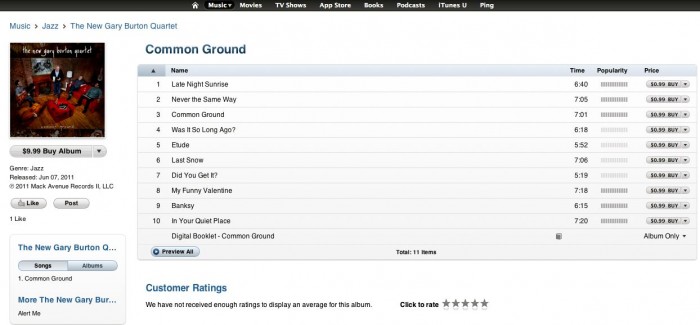Until this week I wouldn’t have even thought twice – legendary vibes player Gary Burton just released a new album yesterday, so I headed to Amazon.com to grab the MP3 album. But then I stopped and thought – if I buy this on iTunes I know it will be saved and available for any of my devices, will be stored on iCloud without penalty, and so on.
But if I go to Amazon’s MP3 store to buy, I *should* be able to use iTunes Match in the fall which will allow the album to be tracked and not incur a storage penalty. I say ‘should’ because you never really know. Too much of my music library is filled with rarities and out of print material, and other things so far out of the mainstream that whenever you hear someone touting numbers of statistics about music library inclusion … you can be sure that much of my stuff falls outside of that.
So I am contemplating buying a new recording at iTunes rather than Amazon in order to ensure it will be available as part of my ‘iTunes in the Cloud’. No big deal, right? Ultimately it depends on how you value your money compared with convenience and comfort.
The Gary Burton MP3 album costs $9.99 on iTunes, and $8.99 on Amazon. That is a $1.00 or 10% difference. That doesn’t seem like much – and it isn’t. But next week the new Pat Metheny recording comes out, and that has the exact same issue, but worse! iTunes has the pre-order set at $11.99 and Amazon has it at $10.49 (~12.5% difference). The iTunes has an added bonus track not found on the Amazon listing, but the Amazon one is much more likely to go on sale for even cheaper on the day of release … and might still get updated with additional material in the next week.
There have been numerous articles about how iCloud is yet another way for Apple to lock us into their ecosystem, and to an extent it makes sense: the other night I was typing up notes at a local statistical society meeting held where there was no wifi and DropBox is blocked at work where I was before, so I had to email myself the template and open it in Documents2Go, then email it back to myself later. I can get to iWork.com from work, so I believe that with iCloud I would be able to use Pages to take the same notes on the iPad and they would be instantly available on my Mac when I got home. It would also drastically curtail my Docs2Go and DropBox usage.
I have enjoyed using Amazon’s MP3 store because of the value – same music, nearly the same sound quality, and almost always significantly cheaper (for me 10% or more is ‘significant’). Also, with the Amazon downloader my music gets properly inserted into iTunes, and unlike with eMusic I have never had an issue with cover art not making the trip (though the digital booklets I don’t care about seem to get lost in the shuffle). But if I am now going to be concerned with long-term availability on my iOS devices -and chances are high I will be using them for a number of years – then the added cost suddenly is less of an issue. But it makes me resent Apple, to be honest.
While I have been thinking about these issues this week I took a different approach – I used Gary Burton’s new Common Ground to test out on-demand responsiveness to new releases on Rdio, MOG and Slacker. The results? Rdio had a listing but nothing to access; Slacker had the listing and obviously the music (one song came up on a ‘radio station’ based on the album; and MOG had the entire thing – and it is a wonderful recording that I’ve already listened to a few times.
I mention that as a reminder – while Amazon is screwing around losing millions giving away Lady Gaga, and Apple is figuring out how to further lock-in customers while charging full price for everything, customers are finding a new way. Not piracy – but on-demand subscription services like Spotify and MOG, hybrid internet radio sites like Slacker and mSpot, and more. People are starting to discriminate more and more about which music they want to own versus which they will just stream. And had I not loved Gary Burton’s new recording, I would have just grabbed it for offline access on MOG and never worried about Amazon vs. Apple.

